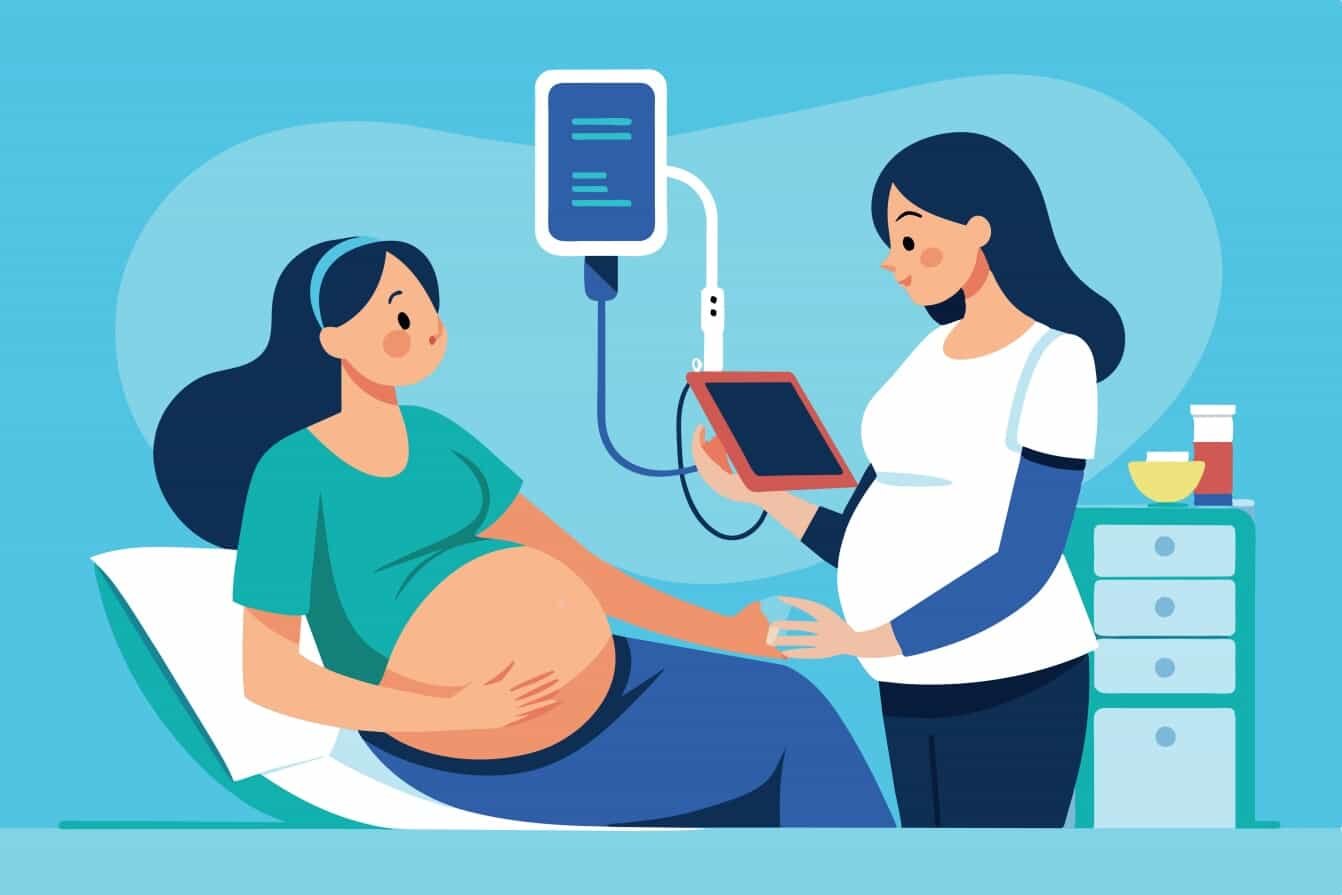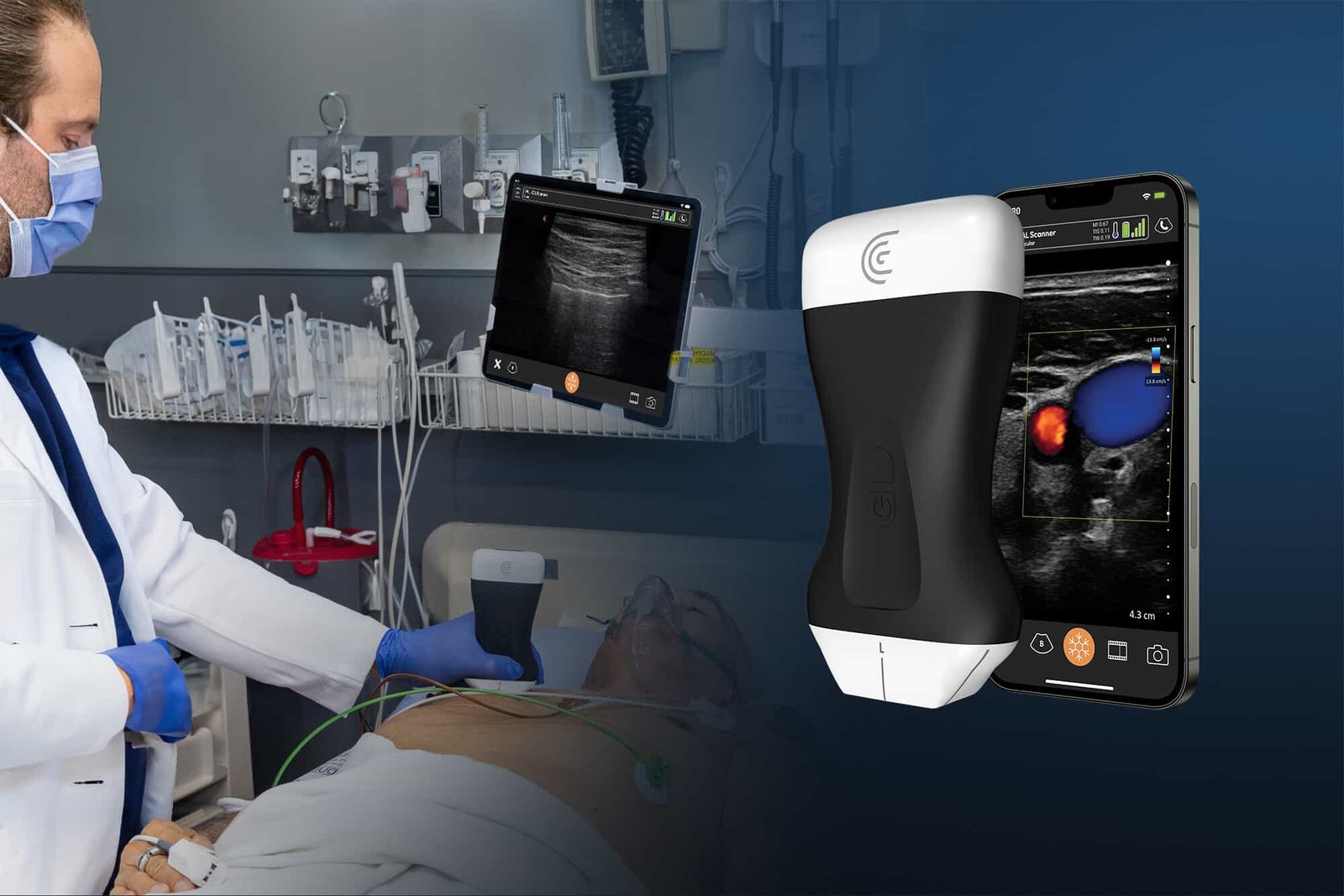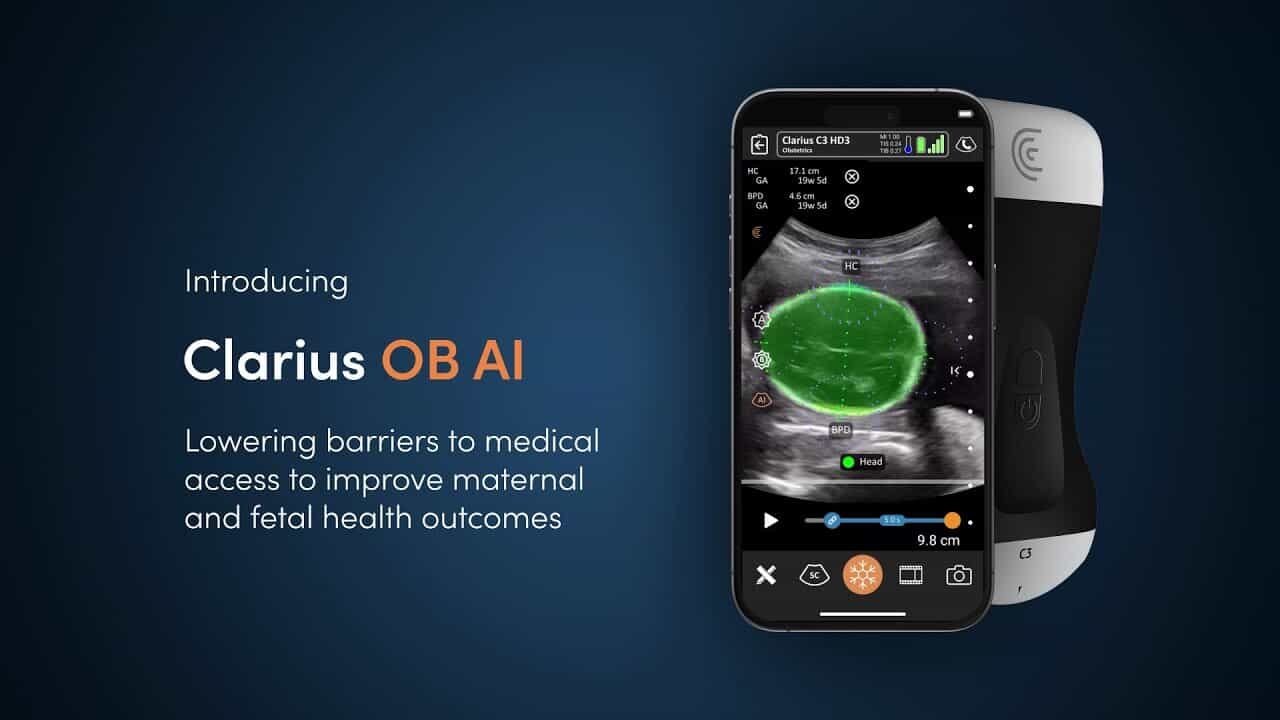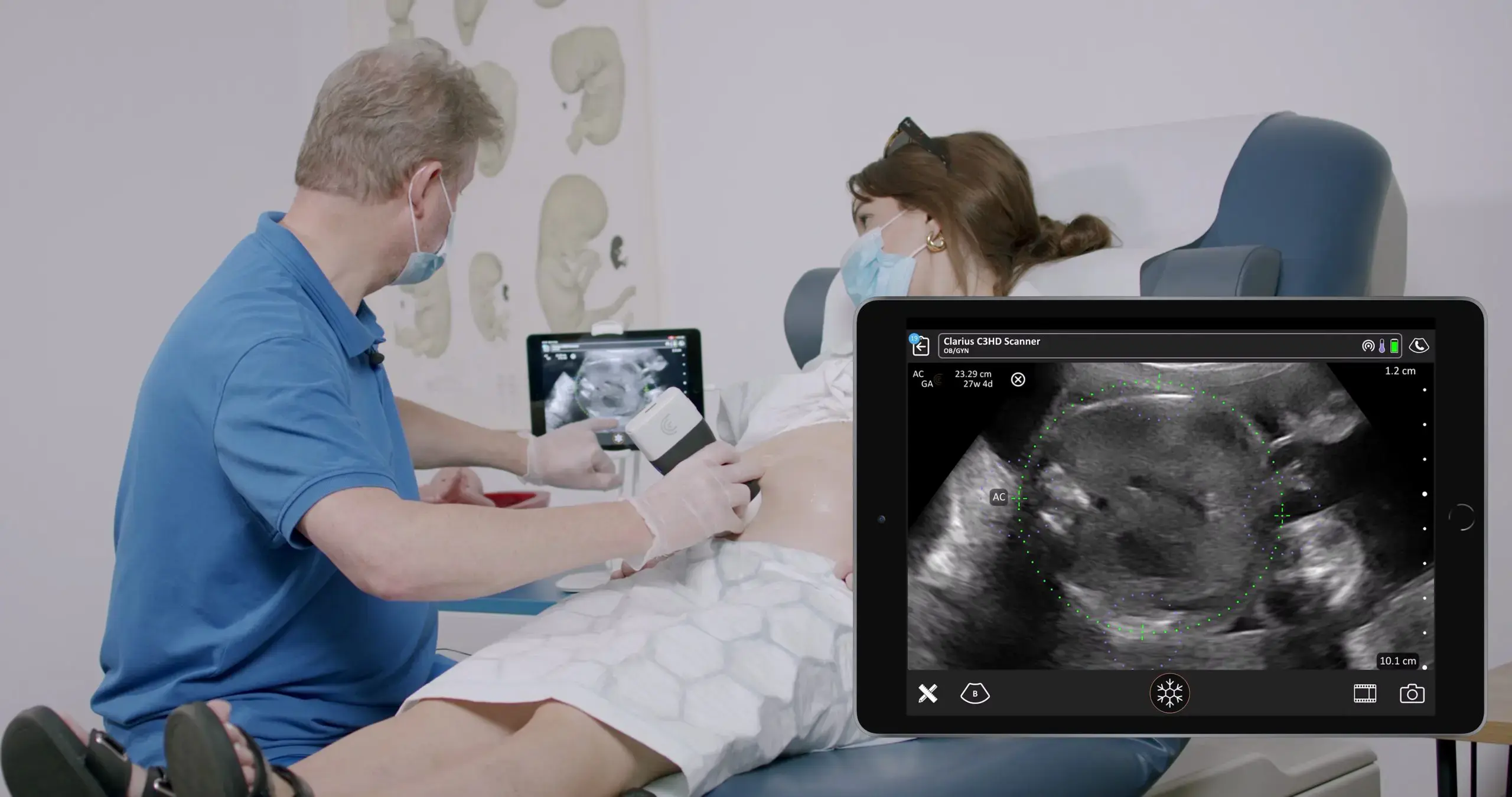Chest pain is one of the most common reasons people visit the ER. Patients and their families often feel stressed and scared and want quick answers. Learning that they will have to wait for an ultrasound to determine the cause of their pain can add to their worries. Moreover, a long wait can lead to a delay in care, leading to suboptimal outcomes.
Imagine how much faster and easier it would be if ER staff could use a portable ultrasound scanner. They could quickly check the cardiovascular system when patients come in with chest pain.
Ultrasound technology has become a staple in both diagnostics and treatment modalities. The ability to visualize interior structures provides significant benefits across medical specialties.
Getting quick answers is essential, whether you work in trauma care or as an OB/GYN. Accurate images help speed up emergency treatment and routine prenatal exams. This is key to providing the best care for your patients.
Since launching its first wireless US device in 2016, Clarius has become a leader in point-of-care US devices. Its product line now includes scanners for different medical fields. It also offers AI-powered apps for better accuracy and interpretation.
Powered by how to embed youtube video and snabblån
What Is Clarius Mobile Ultrasound?
Ultrasound technology has had many medical uses since the 1960s. A Scottish doctor created a way to use ultrasound to make images of fetuses before birth. The early scanners were up to 8 feet tall and, unsurprisingly, stationary. The patient had to come to the US machine, not vice versa.
Over time, devices became smaller and easier to carry. Cart-mounted US machines became common in radiology and obstetrics.
Wireless technology has enabled advances in many areas of medical technology, with ultrasound being a prominent example. Portable US scanners can connect to mobile devices, allowing clinicians to use wireless ultrasounds for patients anywhere.
Scanners can send images to a phone or tablet app. Providers can then view, save, enhance, and interpret these images.
The Clarius range of handheld scanners provides HD3 image quality. It also has an AI-powered app that works with iOS and Android devices. The variations in scanner designs reflect the differing needs of the user. Specialists can choose scanners designed for use in clinical practice.
Key Features of the HD3 Series
Clarius devices feature HD3 imaging using the same technology as top-end cart-based US devices. They boast unique “system-on-a-chip” hardware with Clarius’s Octal Beamforming technology for superior image quality.
The scanners use an AI-powered app with presets, automatic image adjustment, and manual settings. They connect to the app with secure wireless connectivity and a simple WiFi setup. The rechargeable battery takes about 90 minutes to reach full charge and provides 60 minutes of scanning time per charge.
The HD3 series is available in five specialized probes that work for different medical applications:
- C3: Abdominal, Cardiac, Lung, OB/GYN
- EC7: Early OB, IVF, Pelvic, Urology
- PAL: Cardiac, DVT, Lung, Vascular Access
- C7: Abdominal, Bladder, Cardiac, Lung, MSK, Pediatrics, Small Parts, Speech Therapy
- L20: Anesthesia, Dermatology, MSK, Ophthalmology, Pediatrics, Plastic Surgery, Podiatry, Rheumatology, Small Parts, Vascular Access
Clinical Applications by Specialty
No limit exists to the way point-of-care ultrasound technology can enhance medical practice. Healthcare professionals use Clarius technology for diagnostics, monitoring, surgery, and guided injections. Handheld devices bring Clarius equipment to more medical places. This helps remove barriers for patients and improves the speed and quality of care.
Clarius HD3 devices can be used in multiple settings.
Emergency Medicine
Handheld US devices can be game-changing in emergency care. Bringing the imaging equipment to the patient minimizes risks associated with moving patients throughout a facility. The small, handheld devices are easy to maneuver, allowing clinicians to get the imaging they need during trauma care.
Clarius devices can help with FAST assessments for suspected strokes. They can also identify soft tissue injuries and internal bleeding.
Primary Care
Primary care providers often have to refer patients to radiology for imaging. POCUS can enable primary care practices to examine patients for issues like gallstones, respiratory illness, and joint pain. Patients can have imaging done during their visit with the primary care provider. They can receive a diagnosis immediately, without needing extra appointments or waiting for results.
OB/GYN
Ultrasound is a standard part of obstetric care. Clarius devices are adaptable to OB/GYN applications, including early pregnancy detection, pelvic exams, and endocavity scans. The devices are also helpful in fertility procedures, such as ultrasound-guided egg retrieval or embryo transfer.
Cardiology and Vascular
POCUS can be extremely helpful in cardiac care. Doctors can use the devices in cardiology practice for general cardiac window access and DVT screening. You can use the Clarius devices for guided vascular access for diagnostic and procedural purposes.
MSK and Pain Management
POCUS can be used in sports medicine, musculoskeletal care, and pain management. This tool helps visualize painful joints and soft tissues, making it useful for diagnosis and monitoring. The devices can also assist in performing joint injections and nerve blocks.
POCUS devices can be used in many areas, including critical care, plastic surgery, aesthetics, veterinary care, and research.
Choosing the Right Probe for Your Needs
Each Clarius device is designed with particular medical uses in mind. Select the device that best matches what your practice will be using it for:
- Clarius C3 HD3 Convex – Portable Handheld Ultrasound: This device is made for clear imaging. It works well for abdominal, thoracic, pelvic, obstetric, urology, vascular, hip, and spine exams.
- Clarius EC7 HD3 – Portable Handheld Ultrasound: The EC7 features a slim probe that is ideal for use in early obstetrics, gynecology, IVF, pelvic, and urology exams
- Clarius PAL HD3—Phased + Linear Array Scanner: This wide-bodied PAL captures images from deep and shallow areas. It is excellent for deep cardiac, vascular, lung, and abdominal imaging.
- Clarius C7 HD3—Microconvex Ultrasound Scanner: The C7 is a smaller device designed for pediatric care. It is also helpful in getting clear imaging of small parts for applications like speech therapy.
- Clarius L20 HD3 – Ultra-High Frequency Linear Scanner: The L20 scanner works well from the skin surface to 4 cm. It’s best for surface scanning situations, such as anesthesia, dermatology, plastic surgery, podiatry, and vascular access.
Best Practices for Point-of-Care Imaging
Here are some best practices to follow when providing point-of-care imaging.
Patient & Probe Positioning
Learning to use the POCUS device means getting good at positioning it. You should avoid putting too much pressure on your hand and wrist. The Clarius website offers video tutorials with tips on ergonomic handling of the devices during specific procedures.
Preset Selection
The Clarius app allows users to use presets that enhance image clarity. These presets can minimize guesswork in positioning the device for faster, more accurate imaging.
Sterile Technique
Clarius scanners are compatible with a variety of third-party scanner covers. These single-use covers are disposable. You can use them with approved cleaning solutions or wipes. This keeps conditions sterile for each patient.
Data Capture
A Clarius membership lets users save and store images in the Clarius Cloud or DICOM. This makes sharing with other healthcare facilities and remote care providers easy and secure.
Optimizing Image Quality
The AI-assisted app with custom presets for each device ensures optimal image quality. The system allows even new users to capture images with sufficient gain, depth & focus. The automated system minimizes shadowing and reverberation for greater clarity. In-app instructions can guide users to adjust factors like angle, pressure, and contact tips for better image capture.
Infection Control and Device Care
Clarius devices are IP67 rated, making them waterproof and fully immersible for disinfection. Disposable probe covers ensure a clean surface for each patient. Users can choose from various disinfecting wipes or cleaning solutions for disinfection between uses.
Clarius sells branded and third-party accessories for storage, charging, and transport.
Frequently Asked Questions
Which smartphones/tablets work best with Clarius?
The Clarius app works with iOS and Android devices.
How long is the typical battery runtime?
Battery life is approximately 60 minutes of scanning and 7 days in standby mode.
Can departments share probes?
Users can share devices, provided they use them as intended. Using them outside the intended scope may result in lower-quality images.
Which disinfection products have authorities approved?
You can disinfect Clarius products with various commercially available wipes and solutions. The manufacturer’s website includes a list of approved disinfection products for each device.
NOTE: Alcohol is not an approved disinfection ingredient, as it can damage components in the device.
Is DICOM export included?
DICOM storage is available with a Clarius membership. See pricing details for membership fees and benefits.
How can I start with Clarius Education?
Clarius offers a wide variety of options for education, including:
- Clarius Classroom with videos detailing how to use devices and the app
- Blog posts, podcasts, and webinars featuring tutorials and expert discussions of clinical uses of the devices
- Clarius Training via Live Personalized Education Sessions is available with a membership
- In-app active learning and follow-along tutorials are available with membership
Conclusion
Clarius’s POCUS devices offer great flexibility and are easy to use. They provide advanced imaging that fits in your pocket. Explore Clarius devices from Marcroft Medical or contact us to request a demo or trial of the HD3 series.






